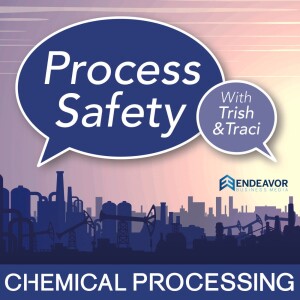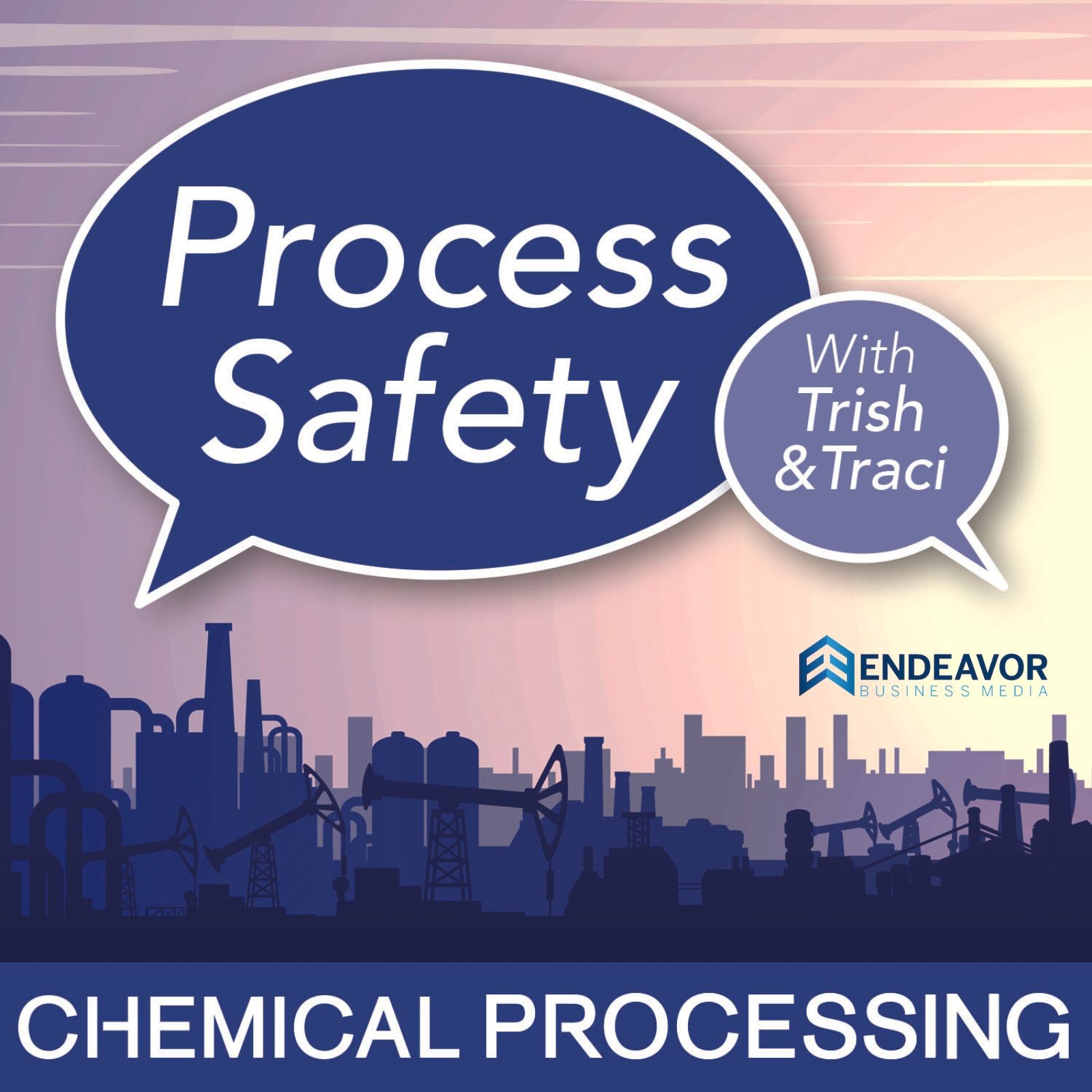Episodes

Tuesday Sep 09, 2025
How Equipment Reliability Impacts Process Safety
Tuesday Sep 09, 2025
Tuesday Sep 09, 2025
This episode explores the critical role of equipment reliability in chemical processing, focusing on three major incidents: Longford, BP Texas City and Buncefield. Trish highlights how faulty instrumentation, poor maintenance and overlooked management of change led to catastrophic failures, fatalities and environmental impacts. The discussion emphasizes safety-critical elements, maintenance KPIs and the importance of accurate instrumentation.

Tuesday Aug 26, 2025
Process Safety: The Dangers of Blindly Following Instructions
Tuesday Aug 26, 2025
Tuesday Aug 26, 2025
Workers who challenge flawed procedures can improve safety and production. In this episode, Trish Kerin reads her latest column, which details how a trip to Tasmania with her sister turned getting lost into a process safety lesson of not blindly following procedures.
Enjoy as our favorite Australian safety guru guides you through the Bass Strait to Cataract Gorge.

Tuesday Aug 12, 2025
Challenge the Illusion of Safety
Tuesday Aug 12, 2025
Tuesday Aug 12, 2025
In this episode, Trish Kerin and Traci Purdum discuss process safety insights with Alex Fernando and Warren Smith from Incident Analytics. Their research analyzed over 10,000 incidents across 12 countries and multiple high-risk industries.
Key findings include that organizations often misclassify serious incidents, missing critical learning opportunities. Many safety controls are "difficult" or "unworkable" in practice, with workers adapting procedures to get jobs done despite inadequate equipment or impractical requirements. The research reveals a significant gap between "work as imagined" and "work as done."
A fundamental shift in leadership thinking needs to take place — from asking "why didn't they follow the procedure?" to "why couldn't they follow the procedure?"
References:

Tuesday Jul 15, 2025
Lessons From Deadly Permit-to-Work Failures
Tuesday Jul 15, 2025
Tuesday Jul 15, 2025
This episode revisits the critical topic of permit-to-work systems, exploring how these systems manage the safe transfer of equipment ownership between operations and maintenance teams. Trish & Traci discuss key elements, different permit types, common failures, and the tragic Piper Alpha disaster.

Tuesday Jul 08, 2025
Process Safety: Serve Up the Tim Tam Slam
Tuesday Jul 08, 2025
Tuesday Jul 08, 2025
Mastering Tim Tam timing mirrors process safety's critical risk-reward balance. Get it right and you’ll reap rewards.
As the bickie became gooey in my fingers, I knew the moment was now — time to slam that Tim Tam.
A Tim Tam is an Australian bickie — or cookie, to those of you in the U.S. It was created in 1964 by Arnott’s and is an iconic Aussie treat. It consists of two rectangular bickies with a flavored cream filling that is coated in chocolate. A Tim Tam Slam is a unique way to consume the bickie. The steps are as follows:

Tuesday Jun 24, 2025
Lessons Learned from the Columbia Disaster
Tuesday Jun 24, 2025
Tuesday Jun 24, 2025
This 100th episode of "Process Safety With Trish and Traci" examines the 2003 Space Shuttle Columbia disaster through the lens of due diligence. Columbia disintegrated during re-entry after foam debris damaged heat shield tiles during launch. The podcast explores how NASA normalized foam strikes over time, turning "lessons of failure into memories of success." Multiple intervention opportunities were missed due to inadequate resources, poor communication, and cultural barriers.

Tuesday Jun 10, 2025
Taming Static Electricity in Glass-Lined Reactors
Tuesday Jun 10, 2025
Tuesday Jun 10, 2025
On a sunny summer day in 2007 near Wichita, Kansas, a tanker truck was offloading naphthalene into a stainless-steel tank at a solvent tank farm when the container spontaneously ignited, catching fire and exploding, shooting projectiles in the air. This led to the evacuation of thousands in a nearby community. While there were no casualties, the explosion destroyed the entire storage facility, luckily not causing any injuries or fatalities in the nearby community.
An investigation determined that electrostatic charge buildup had caused a spark that ignited a solvent-air mixer in the vapor space in the vessel receiving naphtha from the tanker truck.
In this episode, Traci Purdum, CP's editor-in-chief, reads an article from authors Tom Patnaik and Christian Stentzel -- both of Thaletec. The article was published May 21, 2025.

Tuesday May 27, 2025
AI and Machine Learning Transform Compliance, But Humans Still Key
Tuesday May 27, 2025
Tuesday May 27, 2025
Risk assessment should still be a manual process, but AI can streamline data collection to enable sound engineering judgments.
In this episode, Trish and Traci welcome guest Dheerajkumar Narang, whose research examines how AI and machine learning can enhance process safety compliance. Traditional compliance methods are time-consuming and fragmented across different systems, while AI can automate data collection, identify leading indicators and predict compliance outcomes. Key challenges include system integration with legacy infrastructure and maintaining domain expertise for regulatory updates. AI should streamline processes to allow operators to focus on critical tasks.

Tuesday May 13, 2025
Callide Power Station: 34 Minutes to Disaster
Tuesday May 13, 2025
Tuesday May 13, 2025
In this episode, Trish and Traci discuss the catastrophic failure at Queensland's Callide Power Station C4 on May 25, 2021, which caused power outages for 470,000 people. During a routine switching operation to replace DC battery systems, a voltage drop was misinterpreted as an AC fault, triggering a cascading failure. Both AC and DC systems failed, leaving the turbine without lubrication while it continued spinning backwards at 3,000 RPM.
The incident demonstrates that process safety principles apply beyond traditional chemical plants to any high-hazard environment. Key lessons include proper hazard identification, functioning safety controls, and maintaining culture, leadership, accountability and governance in safety management.

Tuesday Apr 29, 2025
Process Safety: Wield Questions to Learn and Teach
Tuesday Apr 29, 2025
Tuesday Apr 29, 2025
This In Case You Missed It episode brings the written word to life. Today, Trish Kerin, the director of Lead Like Kerin, and Stay Safe columnist for Chemical Processing, will read her column “Wield Questions to Learn and Teach”
“Curiosity killed the cat, but satisfaction brought him back.” – A proverb made modern by Eugene O’Neill.
Have you ever asked a question at work and were surprised by the answer? Over the course of my career, this has happened many times. Sometimes, the answer was genuinely new to me. Other times, I was surprised that someone thought the answer they provided was legitimate. In both cases, I learned something.
Written By: Trish Kerin
Read By: Trish Kerin
Read Article HERE

